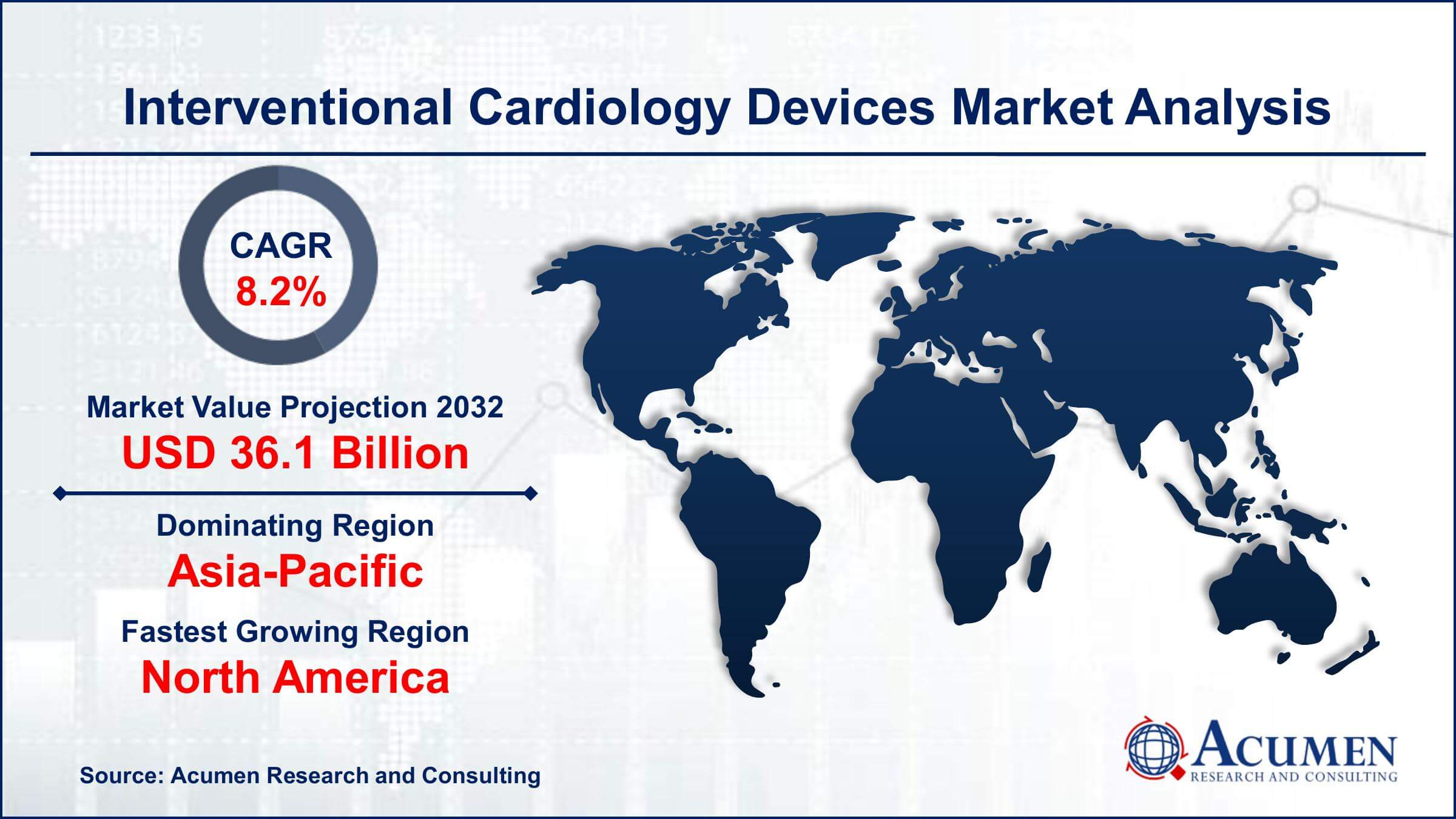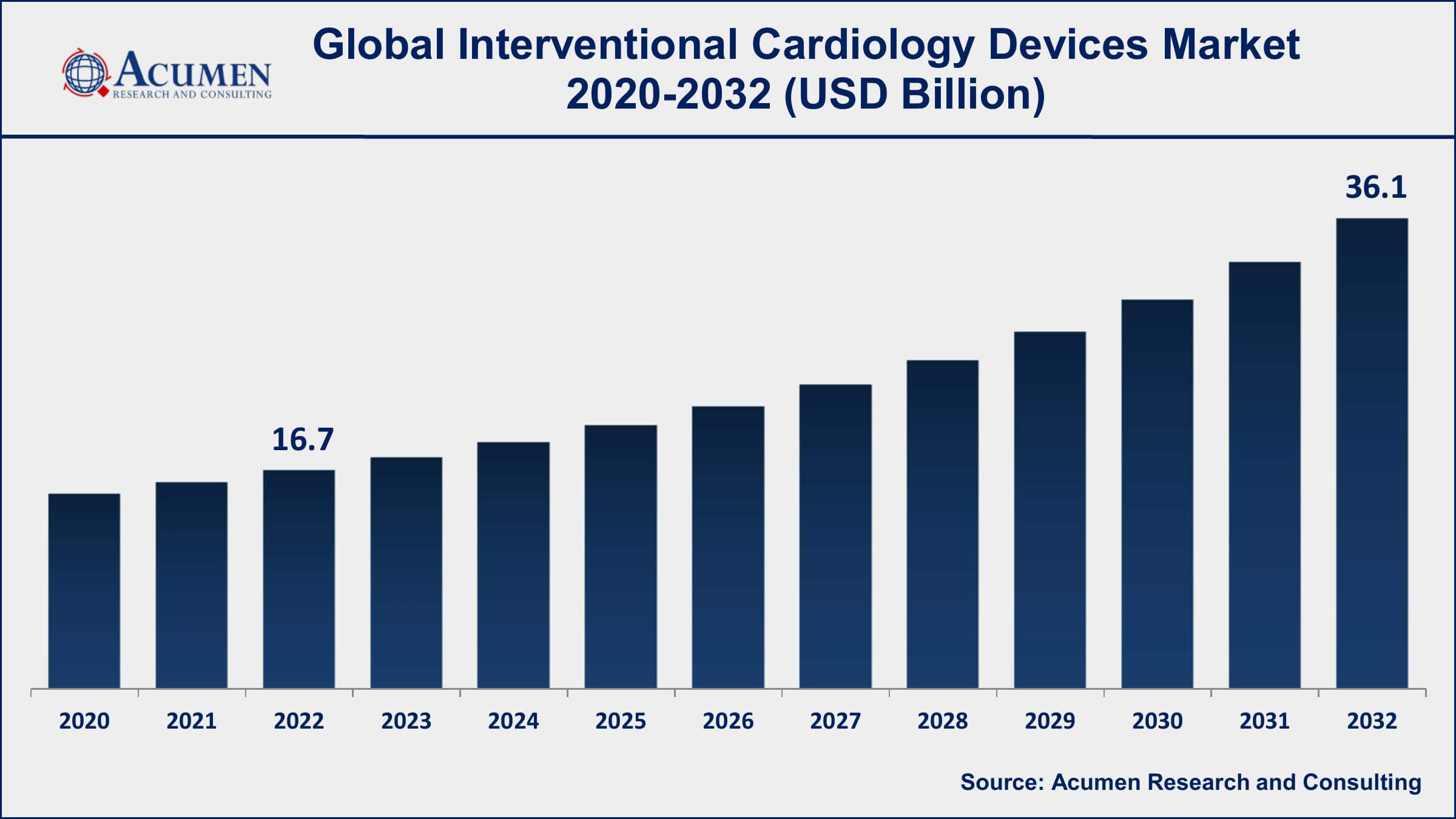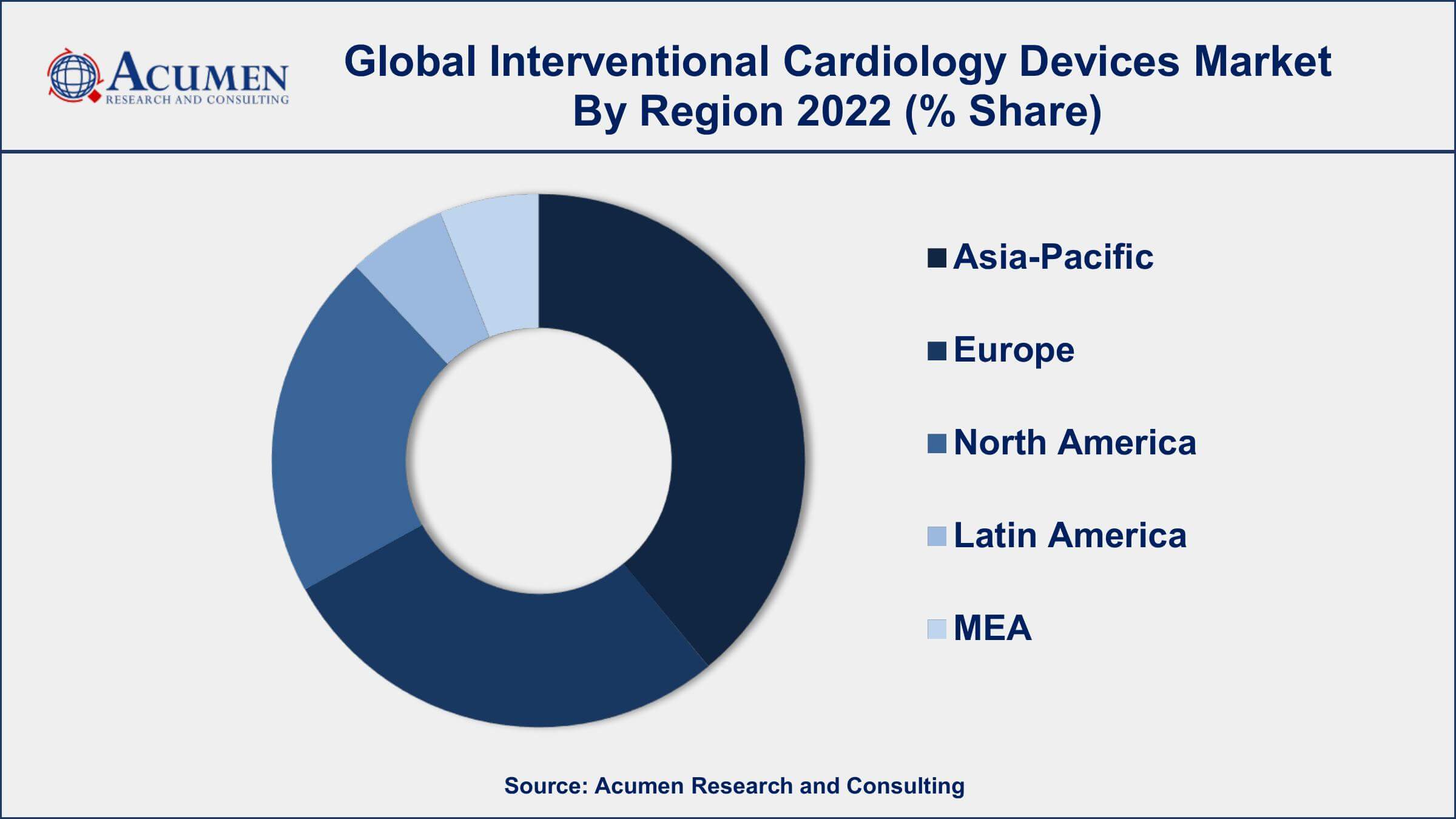Interventional Cardiology Devices Market Size - Global Industry, Share, Analysis, Trends and Forecast 2023 - 2032
Published :
Report ID:
Pages :
Format :
Interventional Cardiology Devices Market Size - Global Industry, Share, Analysis, Trends and Forecast 2023 - 2032
Report Coverage
- Industry Dynamics
- Market Size and Forecast Data
- Segment Analysis
- Competitive Landscape
- Regional Analysis with a Niche Focus on Country-Level Data
- High Level Analysis - Porter's, PESTEL, Value Chain, etc.
- Company Profiles of Key Players
- Option to Customize the Report As Per Your Specific Need
Request Sample Report
The Global Interventional Cardiology Devices Market Size accounted for USD 16.7 Billion in 2022 and is projected to achieve a market size of USD 36.1 Billion by 2032 growing at a CAGR of 8.2% from 2023 to 2032.
Interventional Cardiology Devices Market Key Highlights
- Global Interventional Cardiology Devices Market revenue is expected to increase by USD 36.1 Billion by 2032, with a8.2% CAGR from 2023 to 2032
- Asia-Pacific region led with more than 52% of Interventional Cardiology Devices Market share in 2022
- North America Interventional Cardiology Devices Market growth will record a CAGR of more than 12.2% from 2023 to 2032
- According to the American Heart Association (AHA) 2021 report, over 1 million coronary angioplasty procedures are performed annually in the United States
- By product, the angioplasty stents segment has accounted more than 29% of the revenue share in 2022
- By product, the angioplasty catheters segment is predicted to grow at the fastest CAGR between 2023 and 2032
- Rising prevalence of cardiovascular diseases globallyces, drives the Interventional Cardiology Devices Market value

Interventional cardiology devices are medical devices used to diagnose and treat various heart conditions through minimally invasive procedures. These devices are designed to access the heart and its blood vessels through small incisions or punctures, reducing the need for open-heart surgery. Interventional cardiology procedures often involve the use of catheters, guidewires, stents, balloons, and other specialized devices to perform tasks such as clearing blockages, widening narrowed arteries, repairing heart defects, or delivering medication directly to the affected areas.
The market for interventional cardiology devices has experienced significant growth in recent years and is expected to continue expanding in the coming years. This growth can be attributed to several factors, including the rising prevalence of cardiovascular diseases, advancements in device technologies, and increasing demand for minimally invasive procedures. Additionally, the aging population and the growing adoption of sedentary lifestyles contribute to the increasing incidence of heart-related conditions, driving the need for interventional cardiology devices. Additionally, the ongoing research and development activities aimed at further enhancing the efficacy and safety of these devices will likely propel the market forward, providing new opportunities for device manufacturers and healthcare providers alike.

Global Interventional Cardiology Devices Market Trends
Market Drivers
- Rising prevalence of cardiovascular diseases globally
- Increasing demand for minimally invasive procedures
- Technological advancements and innovations in interventional cardiology devices
- Growing geriatric population, which is more susceptible to heart-related conditions
- Increasing adoption of sedentary lifestyles leading to a higher risk of heart diseases
Market Restraints
- High cost associated with interventional cardiology procedures and devices
- Lack of skilled healthcare professionals proficient in performing complex interventional procedures
- Stringent regulatory requirements for the approval and commercialization of interventional cardiology devices
Market Opportunities
- Development of next-generation interventional cardiology devices with enhanced safety and efficacy
- Integration of artificial intelligence (AI) and machine learning (ML) algorithms for personalized treatment planning and decision support
Interventional Cardiology Devices Market Report Coverage
| Market | Interventional Cardiology Devices Market |
| Interventional Cardiology Devices Market Size 2022 | USD 16.7 Billion |
| Interventional Cardiology Devices Market Forecast 2032 | USD 36.1 Billion |
| Interventional Cardiology Devices Market CAGR During 2023 - 2032 | 8.2% |
| Interventional Cardiology Devices Market Analysis Period | 2020 - 2032 |
| Interventional Cardiology Devices Market Base Year | 2022 |
| Interventional Cardiology Devices Market Forecast Data | 2023 - 2032 |
| Segments Covered | By Product, And By Geography |
| Regional Scope | North America, Europe, Asia Pacific, Latin America, and Middle East & Africa |
| Key Companies Profiled | Medtronic PLC, Abbott Laboratories, Boston Scientific Corporation, Johnson & Johnson (through its subsidiary, Cordis Corporation), Terumo Corporation, B. Braun Melsungen AG, Edwards Lifesciences Corporation, Cardinal Health, Inc., Cook Medical (a subsidiary of Cook Group), and Stryker Corporation |
| Report Coverage |
Market Trends, Drivers, Restraints, Competitive Analysis, Player Profiling, Covid-19 Analysis, Regulation Analysis |
Interventional cardiology devices refer to a range of medical devices used in the field of cardiology to diagnose and treat various cardiovascular conditions through minimally invasive procedures. These devices are specifically designed to access the heart and its blood vessels using small incisions or punctures, which significantly reduces the need for traditional open-heart surgeries. Interventional cardiology devices are used by interventional cardiologists to perform procedures such as angioplasty, stenting, atherectomy, and transcatheter valve repair or replacement.
The applications of interventional cardiology devices are diverse and cover a wide range of cardiovascular conditions. One common application is the treatment of coronary artery disease, where devices like balloons, stents (both bare-metal and drug-eluting), and atherectomy devices are used to restore blood flow to the heart by clearing blockages and widening narrowed arteries. These devices help alleviate symptoms such as chest pain and improve overall cardiac function.
The interventional cardiology devices market has been experiencing significant growth and is expected to continue expanding in the coming years. Several factors are driving this market growth. Firstly, there is a rising prevalence of cardiovascular diseases globally, which has created a higher demand for interventional cardiology procedures and devices. Additionally, the increasing adoption of minimally invasive procedures over traditional open-heart surgeries has fueled the demand for interventional cardiology devices.
Technological advancements have also played a crucial role in the market growth. Innovations in device technologies, such as drug-eluting stents and transcatheter aortic valve replacement (TAVR), have revolutionized the treatment of cardiovascular conditions, leading to improved patient outcomes and shorter recovery times. The introduction of advanced imaging technologies, such as intravascular ultrasound (IVUS) and optical coherence tomography (OCT), has enhanced the precision and accuracy of interventional procedures, further driving market growth.
Interventional Cardiology Devices Market Segmentation
The global Interventional Cardiology Devices Market segmentation is based on product, and geography.
Interventional Cardiology Devices Market By Product
- Angioplasty Balloons
- Angioplasty Catheters
- Angioplasty Stents
- Hemodynamic Flow Alteration Devices
- Endovascular Aneurysm Repair Stent Grafts
- Plaque Modification Devices
- Inferior Vena Cava (IVC) Filters
- Accessories
In terms of products, the angioplasty stentssegment acconted the significant revenue share in the global interventional cardiology devices market in 2022. Stents are widely used in the treatment of coronary artery disease and play a crucial role in restoring blood flow to the heart. The increasing prevalence of cardiovascular diseases, coupled with advancements in stent technologies, is driving the growth of this segment. One of the key factors contributing to the growth of the interventional cardiology stents segment is the development of drug-eluting stents (DES). These stents are coated with medications that help prevent restenosis, which is the re-narrowing of arteries after an angioplasty procedure. The introduction of DES has significantly improved the long-term efficacy of stents by reducing the need for repeat procedures. This has led to increased adoption of DES and a subsequent rise in the demand for interventional cardiology stents. Moreover, technological advancements in stent designs and materials have further fueled the growth of this segment. Innovations such as bioresorbable stents, which gradually dissolve over time, and bioengineered stents with improved biocompatibility have enhanced patient outcomes and safety. These advancements have also contributed to reduced complications and improved patient comfort during and after the stent placement procedure.
Interventional Cardiology Devices Market Regional Outlook
North America
- U.S.
- Canada
Europe
- U.K.
- Germany
- France
- Spain
- Rest of Europe
Asia-Pacific
- India
- Japan
- China
- Australia
- South Korea
- Rest of Asia-Pacific
Latin America
- Brazil
- Mexico
- Rest of Latin America
The Middle East & Africa
- South Africa
- GCC Countries
- Rest of the Middle East & Africa (ME&A)

Interventional Cardiology Devices Market Regional Analysis
Asia-Pacific has emerged as a dominating region in the interventional cardiology devices market due to several key factors. Firstly, the region has a large and rapidly growing population, which has contributed to a higher prevalence of cardiovascular diseases. Factors such as sedentary lifestyles, unhealthy dietary habits, and an aging population have led to an increased burden of heart-related conditions. As a result, there is a high demand for interventional cardiology devices and procedures in the region. Moreover, Asia-Pacific has witnessed significant advancements in healthcare infrastructure and a rise in healthcare spending. Countries like China, India, Japan, and South Korea have made substantial investments in healthcare facilities, including specialized cardiac centers equipped with state-of-the-art interventional cardiology technologies. The improving healthcare infrastructure has led to enhanced accessibility and availability of interventional cardiology devices and procedures, thus driving market growth in the region. Furthermore, the Asia-Pacific region has witnessed a surge in medical tourism. Patients from developed countries often travel to countries in Asia-Pacific for high-quality and cost-effective healthcare services, including interventional cardiology procedures. This influx of medical tourists has further boosted the demand for interventional cardiology devices in the region.
Interventional Cardiology Devices Market Player
Some of the top interventional cardiology devices market companies offered in the professional report include Medtronic PLC, Abbott Laboratories, Boston Scientific Corporation, Johnson & Johnson (through its subsidiary, Cordis Corporation), Terumo Corporation, B. Braun Melsungen AG, Edwards Lifesciences Corporation, Cardinal Health, Inc., Cook Medical (a subsidiary of Cook Group), and Stryker Corporation.
Frequently Asked Questions
What was the market size of the global interventional cardiology devices in 2022?
The market size of interventional cardiology devices was USD 16.7 Billion in 2022.
What is the CAGR of the global interventional cardiology devices market from 2023 to 2032?
The CAGR of interventional cardiology devices is 8.2% during the analysis period of 2023 to 2032.
Which are the key players in the interventional cardiology devices market?
The key players operating in the global market are including Medtronic PLC, Abbott Laboratories, Boston Scientific Corporation, Johnson & Johnson (through its subsidiary, Cordis Corporation), Terumo Corporation, B. Braun Melsungen AG, Edwards Lifesciences Corporation, Cardinal Health, Inc., Cook Medical (a subsidiary of Cook Group), and Stryker Corporation.
Which region dominated the global interventional cardiology devices market share?
Asia-Pacific held the dominating position in interventional cardiology devices industry during the analysis period of 2023 to 2032.
Which region registered fastest CAGR from 2023 to 2032?
North America region exhibited fastest growing CAGR for market of interventional cardiology devices during the analysis period of 2023 to 2032.
What are the current trends and dynamics in the global interventional cardiology devices industry?
The current trends and dynamics in the interventional cardiology devices industry include rising prevalence of cardiovascular diseases globally, increasing demand for minimally invasive procedures, and technological advancements and innovations in interventional cardiology devices.
Which product held the maximum share in 2022?
The interventional cardiology stents product held the maximum share of the interventional cardiology devices industry.



